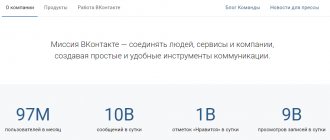General information
Rice.
1. General Director of the social network “VKontakte” Boris Dobrodeev Fig. 2. Creator of the social network “VKontakte” Pavel Durov The project was launched on October 10, 2006. Official website addresses on the Internet: vkontakte.ru (old), vk.com - new. From the old address, users are automatically redirected to a new one, which is shorter and more convenient, according to the developers.
According to information, VKontakte is the first most popular site in Russia and Ukraine, and the sixth in the world. According to Alexa Internet, VKontakte is in second place in Russia (after Yandex) and Ukraine, third in popularity in Belarus and 24th in the world.
The site was conceived as a social network for young people - Russian students and university graduates. Later, VKontakte expanded its audience. The purpose of the resource began to be defined as “a modern, fast and aesthetic way of communicating online.”
The site provides:
- making a list of friends;
- creation of interest groups;
- uploading photos, audio recordings and videos;
- discussions, etc.
Audience
The daily audience of VKontakte in January 2014 amounted to about accounts, and site traffic reached 70 million users per day. Georgy Lobushkin noted that most of the new registrations come from the CIS countries. All accounts are linked to mobile phone numbers.
As of September 15, 2015, VKontakte has more than 320 million registered users, about 65% are from Russia. Of these, 24% are Muscovites, 11% are St. Petersburg residents. 59% of users are over 25 years old.
Avatar on a social network
You may be very surprised now, but there is no avatar in VK. The photo that many are accustomed to thinking of as an avatar is actually called “Photo of the main page.” As for the established imprecise term, it means a picture to personalize the user. Basically, they are used on forums and in almost 100% of cases they are just a picture, not a photo of a person. Basically, if you put a picture of a dog from the Internet on the main photo and say that this is an avatar, then most likely you will be right. But it’s not customary to do this on social networks, because real people with real photographs communicate here.
Management
General Director of VKontakte since 2014 - Boris Dobrodeev (Fig. 1)
, , son of Oleg Dobrodeev - general director of the All-Russian State Television and Radio Broadcasting Company (VGTRK).
Creator and leader Pavel Durov (Fig. 2)
in April 2014, he left the post of general director of the resource and left Russia. According to the former press secretary of the social network Vladislav Tsyplukhin on his Facebook page, Pavel Durov returned to Russia, but for how long is unknown.
Other terms on VKontakte
Messages or SMS: messages on VK are simply called messages. This is not an SMS, as many people are used to thinking. SMS are short text messages sent via mobile operators. Therefore, saying “Oleg, I will send you an SMS on VK” is wrong. Posts or Messages: The term posts refers to private messages or conversations only. And posts are posting information in communities or on your wall. Saying “Misha, comment on my post in the public page” will not be entirely correct. If you are an active user of this social network, you will be one hundred percent interested in reading our article “How to make an interesting page on VKontakte.”
Site history
History of the name
At the launch stage of the social network, one of the name options was “Studlist.ru”, since at first they planned that the resource would be for students. But then they decided that the site should target all social groups of people.
The name “VKontakte” was invented by Pavel Durov while listening to the radio station “Echo of Moscow,” where they regularly repeated the phrase “In full contact with information.”
Project history
2006
The domain name (website address) of the social network was registered on October 1, 2006.
The official “birthday” of VKontakte is October 10, 2006, when the first functions of the site appeared.
On November 22, 2006, on the forum of students of St. Petersburg State University (St. Petersburg State University), a message appeared from the owner of the forum, Pavel Durov, about the launch of a closed application to the forum - “VKontakte.ru”, where anyone could register (providing real data about themselves), to whom Pavel Durov sent an invitation.
At the end of November, registration on the site became free (without invitations). The creators of the resource launched competitions to attract new users; the most active distributors of information about VKontakte were awarded prizes from: “Apple iPod video”, “Apple iPod nano”, “Apple iPod Shuffle”, etc.
2007
The VKontakte.ru website quickly gained popularity. From February to November 2007, the number of VKontakte users increased from 100 thousand. to more than 3 million.
In April 2007, according to statistics from alexa.com, VKontakte became the most popular social network in Russia and surpassed Odnoklassniki.ru in terms of traffic, in May 2007 - the Chinese Xiaonei and equaled the German StudiVZ.
At the end of the year, the site took second place in the popular vote for the “Runet Prize” (the entertainment portal bash.org.ru took first place).
2008
In January, the “Professional Contacts” service appeared on the site, which helped specialists find well-paid jobs, and companies found the employees they needed.
On February 14, the following services were added to VKontakte: “Opinions” (with the help of which users could leave anonymous confessions to friends) and “Suggestions” (the service helped to find friends with similar interests: travel companions for joint trips, partners for dancing, sports, etc. .). These additional features could be enabled at will.
On February 23, a new user rating system using SMS messages was launched.
On February 28, the site interface became available in Ukrainian. According to alexa.com, VKontakte took third place in popularity in Ukraine after Google and Mail.ru.
In March, a WAP version of the site for phones and an expanded GPRS version for PDAs and smartphones appeared on m.vkontakte.ru.
year 2009
In April, 14.3 million unique users from Russia visited the VKontakte resource, and 7.8 million visited Odnoklassniki.
On September 5, VKontakte (vkontakte.ru) bought the domain vk.com in order to promote the resource on the international market and launch multilingual versions of the site.
2010
On February 2, the 60 millionth user registered on VKontakte, and in November 2010, the 100 millionth user.
On April 17, a payment system with zero commission was opened on the site.
On June 21, a function appeared for MTS subscribers to receive free SMS notifications about events on VKontakte (new messages, etc.). Later they were joined by subscribers of the Russian operators Beeline, Megafon and the Ukrainian life:).
On October 20, the interfaces of user pages were switched to microblog mode, which caused outrage among many.
The microblog allowed users to leave comments under posts on their wall and on the walls of other users, like them, repost posts, etc.
At the end of December, a service appeared that allows you to quickly view all your friends’ photos and the ability to add videos from other video hosting sites (YouTube, RuTube, etc.) to your videos.
2011
On February 11, the site's security was improved. When an attempt is made to log in using a username from another country, a message appears asking you to enter the last digits of the phone number to which the page is linked.
Since February 12, posts on users’ walls have become visible to everyone (previously they could be hidden).
On March 30, a version of the site for iPhone appeared. The “My Applications” section has been updated. Users were able to see what apps their friends were installing, etc.
On July 14, VKontakte closed its payment system.
2012-2013
New services appeared on the site, in particular, users were able to attach images, audio and videos, documents, etc. to their comments.
year 2014
On April 1, Pavel Durov announced on his VKontakte page that he was resigning from the post of general director of the company, as his freedom of action had been greatly reduced.
On April 3, Durov announced that he had withdrawn his resignation letter.
It later turned out that the resignation letter was not withdrawn. On April 21, Pavel Durov left the post of general director of VKontakte LLC.
On September 16, she completely purchased the resource, becoming its sole owner.
On September 18, Boris Dobrodeev was appointed general director of VKontakte.
2015
In January, the social network experienced frequent failures; on January 10, in several countries, including Russia, the site completely stopped working.
In July, VKontakte Instagram. Two and a half weeks later, VKontakte management blocked links to Instagram that users sent through private messages and published on their pages (the links became inactive - they could not be clicked on).
On August 4, the site was unavailable worldwide due to a cable break between data centers.
In September, the VKontakte administration announced the launch of a new service “VKontakte Products”.
In the fall of 2015, the social networks Facebook and Instagram began blocking links to the VKontakte website that users left in personal messages and comments on posts on pages.
Interesting Facts
- In 2008-2009, a bug was discovered on the site, due to which it was possible to view user photos that were closed by privacy settings.
- VKontakte has been translated into 70 languages, including exotic ones: for example, into the Dravidian language Kannada of the inhabitants of southwestern India.
In addition to existing languages, you can find “Soviet” and “pre-revolutionary” on the site. If you select “Soviet language”, then instead of the usual menu lines there will be: “My Dossier” (“My Page”), “My Comrades” (“My Friends”), “My Photo Cards” (“My Photos”), “My Recordings "("My Audio Recordings"), "My Information Bureau" ("My News"), etc.
- The average age of VKontakte employees is 26 years.
- The number of pages viewed by users is more than 2.5 billion pages. This figure is growing every day.
- More than 35 million users visit the site every day.
- More than 65% of users of the VKontakte social network live in Russia.
- Until 2015, the user could not find out who visited his personal page and when. Since 2015, the “Guests and Infographics” application has appeared, by installing which you can find out about the guests of your account.
- Every month, search engines generate more than 4 billion impressions for the query “VKontakte”.
- The social network Facebook became the prototype for the creation of VKontakte. The sites are similar in design, idea, layout and functionality.
- Every month, up to 25 users with the name Vladimir Zhirinovsky, up to 15 people with the name Evgeny Petrosyan and up to 10 people with the name Brad Pitt are registered on the site.
- In the company's office there is a horizontal bar on which everyone can do pull-ups before lunch.
- As of 2015, VKontakte users use the “Like” button more than a billion times every day.
Spelling in VK
After the above steps, refresh the page (F5 key) and observe the changes. Now, if a word contains a spelling error, it will be underlined in red.
p, blockquote 10,0,0,0,0 —>
p, blockquote 11,0,0,1,0 —>
- If you right-click on a word, the correct spelling options will appear in front of you;
- By the way, even if you have already sent an offer with an error, you can easily change the message in VK;
p, blockquote 12,0,0,0,0 —>
As you can see, nothing complicated. As for the VKontakte mobile application, the correct option is usually displayed in the text entry field (although it all depends on the keyboard application).
p, blockquote 13,0,0,0,0 —>
Couldn't enable spell checking in VK? Watch our video tutorial.
p, blockquote 14,0,0,0,0 —> p, blockquote 15,0,0,0,1 —>
useful links
- The effect of advertising on the VKontakte website
- Advertising on social networks
- Promotion in social media
- Optimizm.ru has received the status of an authorized partner of the VKontakte network!
- What to allow and what to prohibit users of online communities: 5 tips for marketers
- Successful website promotion on social networks: 4 win-win strategies











